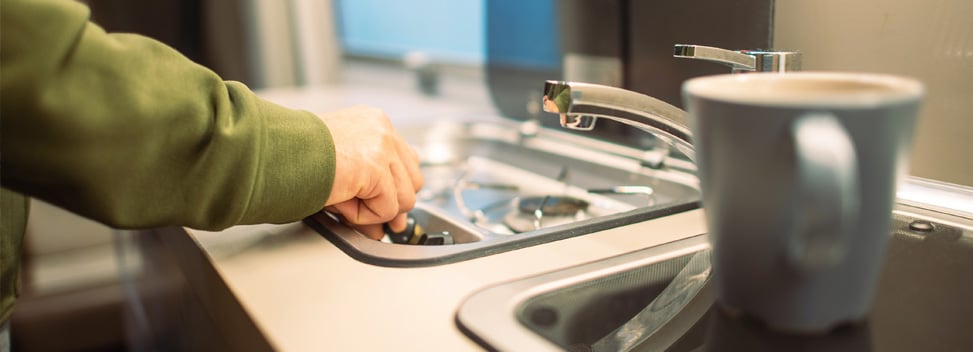Should you use butane or propane gas for your caravan
Written by Nick Grant
|
Published on 28th July 2023
|
Last Updated on 23rd February 2024
|
Read time: 8 minutes

Did you know fuelling your caravan with the wrong gas could void its warranty? Worse still, it could cause a dangerous gas leak, inefficient heating or costly repairs. The good news is that these things can be easily avoided with the right know-how, and that’s where we can help. In this article, we’ll cover what to consider about butane and propane gas, so you can choose a gas source that fuels your caravan safely and efficiently.
What’s the difference between butane and propane gas?
Butane and propane gas are both hydrocarbon gases commonly used as fuel sources in caravans, but they have several distinctions which set them apart. From storage to temperature sensitivity, here are the main differences:
- Application: Butane is often used for indoor applications, such as portable stoves and heaters, while propane is more commonly employed for outdoor purposes like grilling, camping, and powering RVs or caravans.
- Energy content: Propane has a higher energy content per unit volume than butane. It produces more heat when burned, making it suitable for high-demand appliances and heating larger spaces.
- Temperature sensitivity: Propane has a lower boiling point than butane. This means it can vaporise and provide fuel even at colder temperatures. Butane, on the other hand, has a higher boiling point compared to propane. While it can still vaporise and provide fuel at colder temperatures, it may not perform as effectively as propane in icy conditions. Butane is more commonly used for indoor applications or in regions with milder winters.
- Pressure: Propane operates at a higher pressure than butane, making it more suitable for appliances that require a consistent and higher gas pressure, such as certain types of burners and industrial equipment.
- Storage: Butane is commonly stored in smaller, disposable canisters, while propane is typically stored in larger, refillable cylinders or tanks. The availability of different storage options can impact convenience, cost, and portability.
- Safety considerations: Both gases are flammable and require proper handling and storage. However, butane is heavier than air and tends to accumulate in low-lying areas, while propane is lighter than air and disperses more easily.
Is propane or butane better for caravans?
When it comes to fuelling your caravan, the decision between propane and butane boils down to your caravan and personal preferences. Here are some factors to consider:
- Climate: Propane tends to perform better than butane in colder temperatures. Its lower boiling point and higher vapour pressure make it more suitable for consistent fuel supply and performance in colder weather. Therefore, propane may be a better option if you plan to use your caravan in cooler regions or during winter.
- Heat output: Propane has a higher energy content per unit volume than butane. This means that propane releases more heat when burned, making it preferable for applications that require high heat output. If you have high-demand appliances in your caravan or need to heat larger spaces, propane may be a good option.
- Availability: Propane is generally more widely available compared to butane. It can be found in many locations, including gas stations, propane retailers, and camping supply stores. Butane may be less readily available, especially in specific regions or remote areas. Consider the availability of both fuels in the place you’re travelling to.
- Appliance compatibility: Some caravan appliances are specifically designed to operate with either propane or butane. Before deciding, check the specifications and recommendations of your caravan appliances, such as cookers, heaters, and refrigerators, to ensure they’re compatible.
- Container size and weight: Consider the size and weight of the fuel containers or cylinders required for each gas. Butane canisters are often smaller and lighter than propane cylinders, which can be beneficial if you have limited storage space or prefer easier portability.
- Regulatory considerations: Depending on your location, regulations or safety standards may dictate using specific gases for caravans. Familiarise yourself with local regulations and ensure compliance with any requirements related to gas usage in caravans.
- Price: The price difference between propane and butane can vary depending on many factors, including location, market demand, and availability. Generally, propane tends to be more commonly available and widely used, which can contribute to its relatively lower price compared to butane in many regions. However, it’s important to note that price fluctuations can occur over time, and local markets can influence the cost of both gases.
Ultimately, the choice between propane and butane for caravans depends on your needs, travel plans, and available resources. To help you make up your mind, it can be helpful to consult with experienced caravan owners, gas suppliers, or professionals in the industry.
Can you change from propane to butane?
In many cases, changing from propane to butane in a caravan is possible but may require some tweaks and considerations. Below are some points to keep in mind:
- Appliance compatibility: Check your caravan appliances’ compatibility with propane and butane. Some appliances may be specifically designed to operate with one gas type and may not be compatible with the other. Consult the appliance manuals or get in touch with the manufacturer to confirm compatibility.
- Regulator and hose: Propane and butane have different pressure requirements, so you may need to change the regulator and hose that connect the gas supply to the caravan’s appliances. Propane typically operates at higher pressures than butane. Therefore, a regulator designed for butane might not provide adequate gas flow for propane and vice versa. Ensure that the new regulator and hose are suitable for the chosen gas.
- Safety considerations: When switching from propane to butane or the other way around, ensure that the caravan’s gas system and appliances are installed and maintained safely. Follow any specific guidelines or recommendations the manufacturer provides or seek assistance from a qualified gas technician for proper installation and safety.
- Gas container compatibility: Propane and butane are often stored in different types of containers. Propane is typically stored in larger cylinders, while butane is commonly available in smaller canisters. Consider your caravan’s storage compartments or lockers and ensure they suit the size and type of container required for the chosen gas.
- Gas availability: Consider the availability of propane and butane in your travel destinations. Make sure the chosen gas is readily available in the areas where you plan to use your caravan, as limited availability might affect your ability to refuel or restock during your travels.
Before making any changes to the gas system in your caravan, it’s recommended to consult with a qualified gas technician or professional signed up to the accredited Gas Safe register. They can guide your caravan’s setup and ensure all necessary safety precautions are considered.
How to store LPG bottles in a caravan
Both butane and propane are liquefied petroleum gas (LPG). Storing LPG bottles safely in a caravan is essential to minimise risks. Below are some guidelines to ensure you store LPG bottles safely and securely:
- Dedicated storage compartment: Caravans usually have a dedicated external storage compartment or locker for LPG bottle storage. This compartment should be adequately ventilated and located in an accessible but separate area from the living spaces of the caravan.
- Secure mounting: The LPG bottles should be securely mounted in the storage compartment to prevent movement or tipping during travel. Use appropriate mounting brackets or straps recommended by the manufacturer to secure the bottles.
- Upright position: Store the LPG bottles upright to ensure proper gas circulation and minimise the risk of leaks. This also helps prevent any potential damage to the valves or regulators.
- Adequate ventilation: Make sure the storage compartment has sufficient ventilation to dissipate any potential gas leaks safely. Ventilation is crucial to prevent the accumulation of flammable gases and reduce the risk of fire or explosion.
- Leak detection: Regularly check for any signs of gas leaks, such as the smell of gas or hissing sounds. If you suspect a leak, avoid igniting flames or operating electrical devices, and immediately turn off the gas supply. Ventilate the area and seek professional assistance to address the issue.
- Secure compartment: The storage compartment should be securely locked or fastened to prevent unauthorised access, especially by children. This helps maintain safety and prevents tampering with the LPG system.
- Compliance with regulations: Familiarise yourself with local regulations and safety standards regarding LPG storage in caravans. Check that your caravan meets the required safety standards and complies with any legal LPG use and storage requirements.
- Fire safety equipment: Keep a fire extinguisher readily accessible in your caravan in case of emergencies. Check that you and other occupants know how to use it properly.
Always follow the manufacturer’s instructions and consider consulting a qualified gas technician or professional for guidance on LPG storage in your caravan model. They can advise and ensure your LPG system and storage setup meet safety standards.
Get insured with Intasure
Sometimes things don’t go according to plan, even with the proper guidance. Whether it’s gas-related or another unfortunate event, Intasure can provide assurance with specialist caravan insurance. We provide cover for static caravans and touring caravans to help protect against risks such as damage, theft, and natural disasters.
Get in touch for a quote by calling 0345 111 0680 or get a quote online.
The sole purpose of this article is to provide guidance on the issues covered. This article is not intended to give legal advice, and, accordingly, it should not be relied upon. It should not be regarded as a comprehensive statement of the law and/or market practice in this area. We make no claims as to the completeness or accuracy of the information contained herein or in the links which were live at the date of publication. You should not act upon (or should refrain from acting upon) information in this publication without first seeking specific legal and/or specialist advice. Arthur J. Gallagher Insurance Brokers Limited trading as Intasure accepts no liability for any inaccuracy, omission or mistake in this publication, nor will we be responsible for any loss which may be suffered as a result of any person relying on the information contained herein.
FP1021-2023

Nick Grant is a Business Development Manager at Intasure with 10 years of insurance experience.

